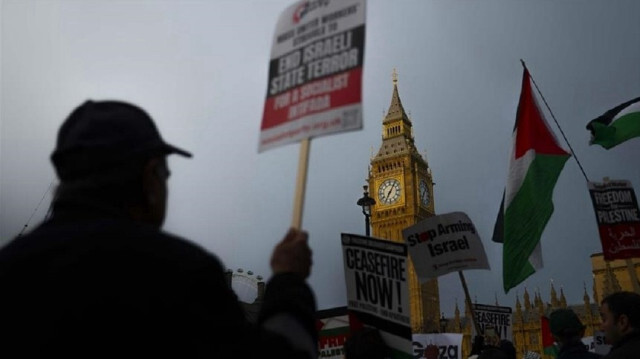
British government, which suspended only 30 of 350 arms export licenses with Israel, under fire for ‘complicity in war crimes' and violating international humanitarian law
As the world marks the first anniversary of Israel's genocide in Gaza, Britain's Labour Party has not made any serious changes to the country's policy on Palestine.
Following July 4 general elections, the Labour government initially imposed a partial arms embargo on Israel and withdrew its objection to an International Criminal Court (ICC) arrest warrant for Israeli Prime Minister Benjamin Netanyahu – moves that were initially seen as promising signs.
Months later, however, no substantial actions have been taken to halt the genocide in Gaza, undermining expectations that the new administration would alter the previous government's approach to the region.
While the Labour government has called for a cease-fire and improvements to the humanitarian situation in Gaza, it has refrained from directly condemning Israel's military actions.
In remarks before the election, Labour Party leader and Prime Minister Keir Starmer said that Israel had the right to cut off electricity, water and fuel to Gaza, a comment that has sparked debate.
-Partial arms embargo on Israel deemed inadequate
The UK has approved more than 100 export licenses for the sale of weapons, military equipment and other controlled items to Israel since the start of the Israel-Hamas war, according to data from the Department for Business and Trade.
Amid warnings that the Israeli army is committing war crimes, the UK's failure to terminate export licenses to companies that sell arms Israel is drawing a backlash both in Britain and abroad.
Foreign Secretary David Lammy announced on Sept. 2 that around 30 of the 350 licenses for arms sales to Israel would be suspended.
However, the partial arms embargo does not include UK-made components for Israel's F-35 fighter jets, which are believed to constitute 15% of the aircraft used in bombings.
Defense Secretary John Healey said the decision to suspend some licenses would not significantly impact Israel's security, asserting that the overall safety of the nation would remain intact.
Human rights organizations have criticized the UK's actions, labeling the partial arms embargo as insufficient and belated.
Labour Party lawmaker Zarah Sultana said the arms sales to Israel "deepen the UK's complicity” in the regional war and "horrific violations of international law."
A parliamentary group known as the "Independent Alliance” comprised of five independent lawmakers supporting Gaza has called for an immediate halt to all arms shipments to Israel.
-UK resumes funding to UN Gaza aid agency after 7 months
The Labour government announced that it would continue funding for the UN agency for Palestinian refugees (UNRWA), reversing a decision made by the previous Conservative administration, which had halted support after allegations against UNRWA staff related to the Oct. 7, 2023 cross-border attacks by the Palestinian group Hamas against Israel.
Lammy said the UK would provide £21 million ($27.5 million) in new funding to UNRWA.
The new government also withdrew its objection to the ICC's arrest warrant for Netanyahu, saying this decision was neither an objection nor an approval of the ICC's case.
Dina Matar, chair of the Center for Palestine Studies at the School of Oriental and African Studies (SOAS) at the University of London, told Anadolu that when the Labour Party came in, there were some slight changes that appeared to be favorable towards the Palestinians and seemingly showing a change in perspective.
“Definitely the UK should have and should announce an embargo on arms sales, because that is so important to try and gain back confidence, to try and show that there is actual will, and action is not only about the rhetoric or about discourse,” Matar said.
-Labour Party ‘a little bit wary' in making major changes in foreign policy
Matar noted that the UK under the Labour Party is “a little bit wary about making significant changes in relation to its foreign policy towards Israel and towards the Palestinians.”
“There is not much that has happened in terms of restraining Israel from pursuing its genocide. And also, we have the issue that always comes up, which is can the UK take a position on its own without the support of the US.
“So at the moment, as you know, the US is about to enter its election race, and with no kind of clear idea of who is going to win that race. I think the UK is possibly staying on the sidelines,” she added.
She indicated that there is uncertainty about whether more concrete steps would be taken against Israel's illegal occupation, noting that Israel's attacks on Gaza have further complicated the situation.
Matar also commented on the UK's withdrawal of its objection to the ICC's arrest warrant against Netanyahu, suggesting that this decision could also be discussed as a "diplomatic maneuver" for a particular period of time to kind of ease tensions, particularly among the Muslim community in the country.

